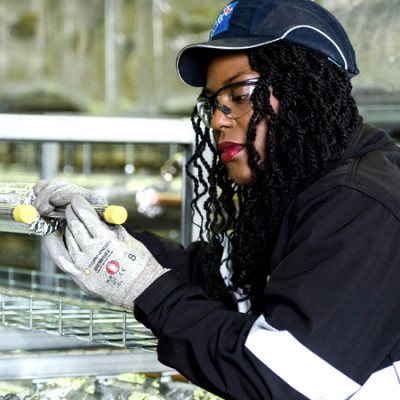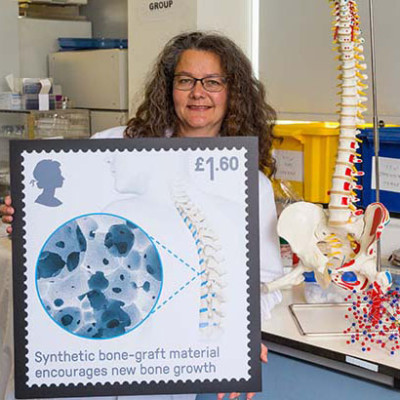News
International Day of Women and Girls in Science: Ten Engineers you should know
10 February 2024


1. Yewande Akinola
“Engineering is about finding solutions that improve people’s lives”
Yewande Akinola is Innovation Lead at Laing O’Rourke and a television presenter. Her work focusses on sustainable water supplies, finding solutions for water sanitation in under-developed countries. She founded Global Emit Project, mentoring young people who are interested in engineering.
2. Lynn Conway
“What I’m interested in isn’t so much who I am, but what I did. The joy I felt – the joy of discovery. The daring to push send on something that I knew was going to change the world.”
Lynn Conway is a pioneer of microchips and computer processing. Despite her contributions to microchip development, she was fired by IBM when she began her gender-affirming transition in 1968. She has since become an advocate for women and transgender people in science and the workplace, as well as continuing her computer engineering work, writing one of the most important books on VLSI processing.
3. Marian Croak
“Many times I’ve felt it’s really to our advantage that we don’t fit in and that we don’t have that seat at that table. It allows us to step back and really observe in quite an objective way as to where the gaps are and what’s needed for change.”
Marian Croak is now Vice President of Engineering at Google, and in the 1990s she invented VOIP – the technology that allows us to make video calls, stay in touch with loved ones during the pandemic, and work from home. She was the second black woman to be inducted into the Inventors Hall of Fame.
4. Karin Hing
“I feel very fortunate that my research has gone on to have such a positive impact on people’s lives, but this would not have been possible without multidisciplinary collaboration.”
Karin Hing is a Biomedical Engineer at QMUL whose pioneering research into synthetic bone grafts was honoured on a stamp commemorating great engineering progress of the past 50 years. She engineered materials that encourage bone growth in orthopaedic surgeries, improving outcomes for hundreds of thousands of patients worldwide.
5. Mary Jackson
“Sometimes they are not aware of the number of black scientists, and don’t even know of the career opportunities”
Mary Jackson was an Aerospace Engineer and the first black woman engineer at NASA. She was so committed to supporting women and people of colour in engineering, that she took a demotion to lead the Federal Women's Program, the Office of Equal Opportunity Programs and the Affirmative Action Program. A character in the film Hidden Figures was based on her, and in 2020 NASA named their Washington headquarters after her.
6. Stephanie Kwolek
“I hope I'm saving lives. There are very few people in their careers that have the opportunity to do something to benefit mankind."
Stephanie Kwolek was a Chemical Engineer most famous for developing Kevlar, a super strong, lightweight polymer fibre used in bulletproof vests, firefighter’s suits, bridges and fibre optic cabling.
7. Vinita Marwaha Madill
“Pursuing your passion and persevering is important”
Vinita Marwaha Madill is a Space Engineer at the European Space Agency, where she developed a robotic arm and a spacesuit with a metric to evaluate muscle and bone loss in space. She founded Rocket Women to encourage other women to pursue science.
8. Caroline Roney
“Virtual twins will benefit everyone from patients to doctors and industry. Better treatment, better-run hospitals, and support for healthcare workers are just a few of the many rewards.”
Caroline Roney is a leading researcher in Digital Twins, using AI technology to predict cardiovascular disease. Based at Queen Mary University of London, her work has recently been reported by the Guardian and featured in several science podcasts. She is also a campaigner for women and girls in STEM.
9. Larissa Suzuki
“I am passionate about using AI for the benefit of humankind regardless of the field of industry.”
Larissa Suzuki is an AI and Space Engineer currently working with NASA, Google and UCL. At just 21 years old she founded AppStudio – enabling people to create their own apps. She also leads The KOI Circle on LinkedIn – the largest Women in STEM group.
10. Gladys West
“I started to think to myself that I’ll be a role model as the black me, to be the best I can be, doing my work and getting recognition for my work.”
Gladys West is an engineer and mathematician whose work led to the invention of GPS. As one of the first black women hired by the USA navy in the 1950s, she experienced racism whilst working with mainly white colleagues during a crucial time for the Civil Rights Movement. Whilst a social and political revolution was happening in the country, she led her own revolution in science, developing early satellite and geo mapping technology.
| Contact: | Ayden Wilkes |
| Email: | a.wilkes@qmul.ac.uk |
| People: |

